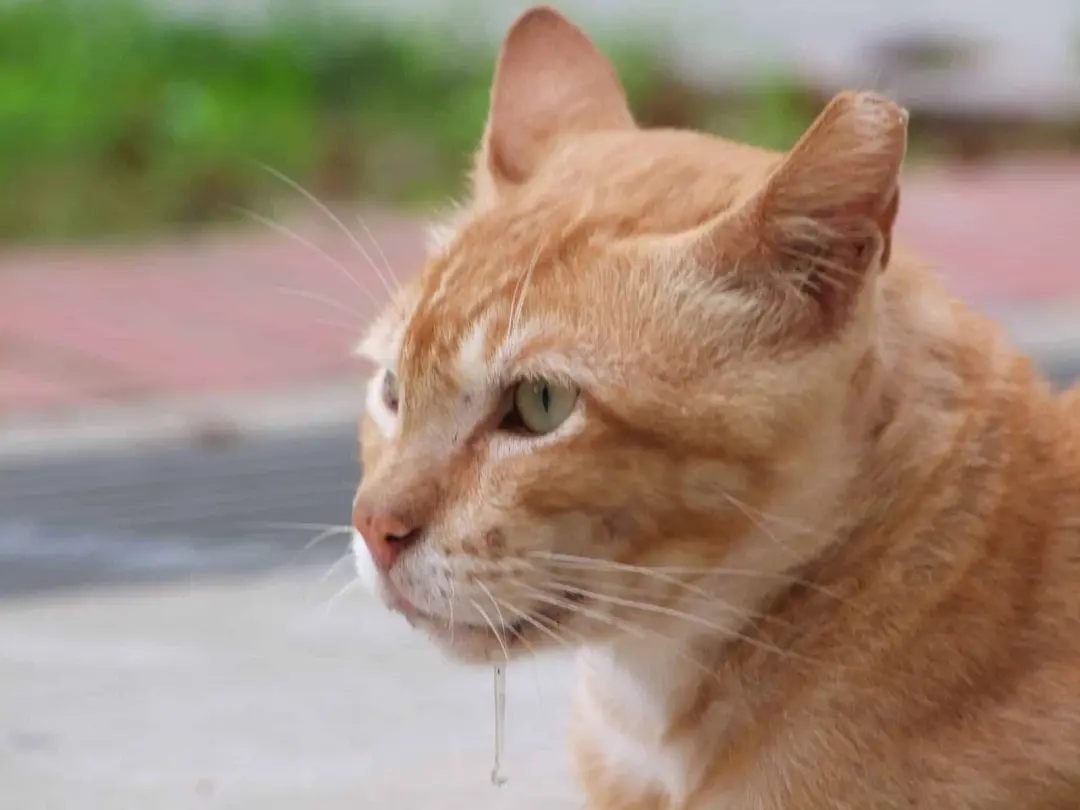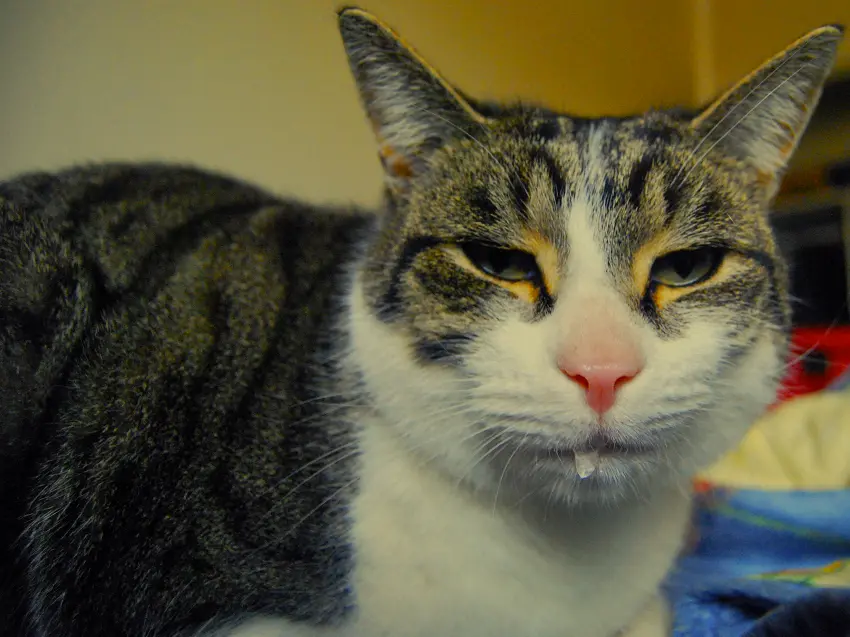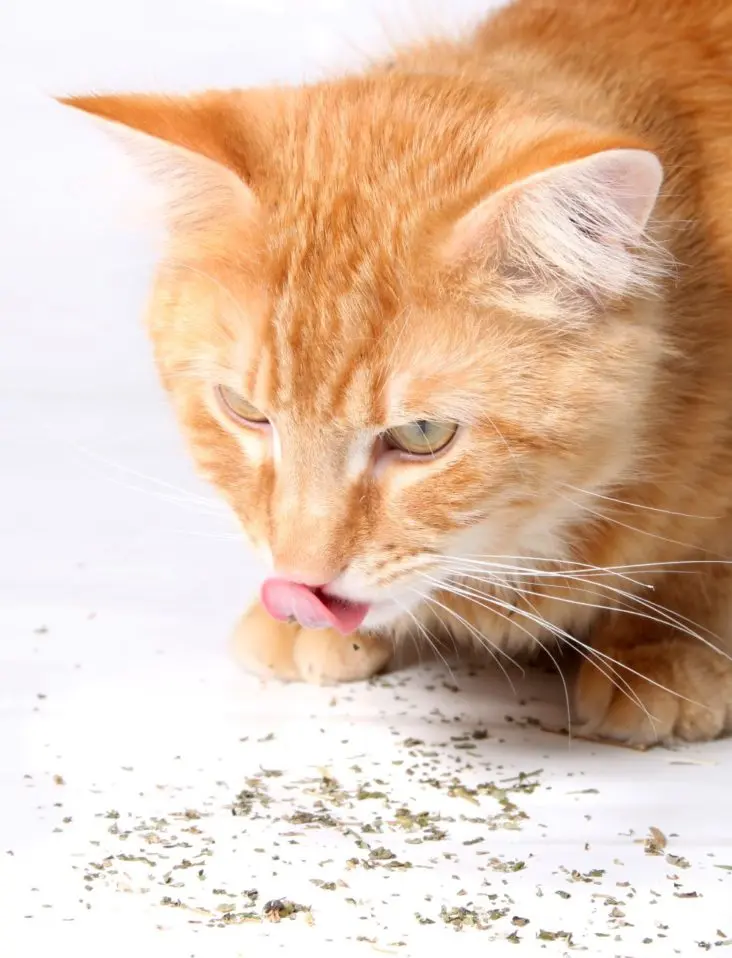Why is My Cat Drooling and Not Eating? 7 Possible Reasons
Why is my cat drooling all of a sudden? Cat drooling can be a sign that your pet has dental problems. Mouth ulcers, lesions, tooth injuries, and gum infections will make your cat drool too much.
It’s also possible that a foreign object got stuck inside its mouth, or your cat got exposed to a toxic substance. Drooling is your cat’s way of expelling these foreign matters.

But whatever the reason behind the drooling, you must get your cat checked by the vet.
Why Is My Cat Drooling and Not Eating?
Excessive drooling among cats is never normal.

The following reasons are the culprit behind this symptom:
1. Trauma
Cats are curious animals, so they have a high chance of experiencing physical trauma. It’s possible that your cat chewed wires and got its mouth burned. Please read here: Tips to Prevent Your Cat From Excessive Chewing
Falling headfirst will also trigger excessive salivation. Signs of trauma may not be easily visible from the outside, and professional examination might be needed.
2. Toxin exposure
Another notorious cause of cat and kitten drooling is exposure to toxic substances. Your cat might have licked a surface you wiped with a cleaner.
Also, your cat probably bit a rat that got exposed to rodenticide. Remember that some household plants like rubber plants, oleander, and poinsettia are poisonous to felines.
Exposure to toxic substances should be considered an emergency situation, especially if followed by cat drooling and diarrhea. You must bring your pet to the vet right away.
3. Dental problems
Why is my cat drooling and smelling bad? Your cat may be suffering from a dental problem. Rotten teeth, ulcers, gum infections, and drainage will have a foul smell. As the cat effort to flush out the irritant, it will drool excessively.
Cats that are over three years old are highly prone to dental problems. Such conditions should be dealt with with the help of a veterinarian for proper treatment.
Remember that dental problems can branch out to bigger infections as pathogens enter your cat’s body through openings in the mouth.
4. Foreign matter
Is your cat playing with its toy and suddenly drooling? It’s possible that a small object got stuck between its teeth. You can try removing the foreign matter, but you can always seek the help of a veterinarian.
If there’s a string that stretches up to your cat’s throat, don’t pull it abruptly. It might cause more irritation and health problems.
Why is my cat drooling and not eating? Remember that foreign substances like medication will also make your cat drool. The cat’s reluctance to swallow due to the bitter taste of medicine will make it salivate a lot.
5. Heatstroke
Yes, cats can get heatstroke, too. Cat breeds with flat faces like Persian, Himalayan, Scottish Fold, and Burmese are prone to overheating if exposed to intense temperatures without proper hydration.
Some of the tell-tale signs of heatstroke among cats are drooling, pacing, and lethargy.
6. Motion sickness
A cat drooling in a car is a sign of motion sickness. This is usually accompanied by gagging, vocalizing, and even panting.
Cats will also lick their lips a lot when experiencing motion sickness. Consider taking shorter and slower car trips to help your cat adjust to the new environment.
7. Upper respiratory infection
“My cat is drooling and sneezing!”. If this is the case, your pet might be suffering from an upper respiratory infection. Please read more: Why Is My Cat Sneezing a Lot
You may also notice nasal and ocular discharge if your cat has URI. This could affect your cat’s throat, nose, and sinuses. It’s important to get this condition addressed right away as it can put your cat’s life in danger.
What Should I Do If My Cat Is Drooling?
Drooling is never a normal response. If you find your cat salivating excessively, you need to assess the reason behind it.
In the first 30 min. of hypersalivation, evaluate the nature of the saliva and other symptoms like lethargy and vomiting.
Examining your cat will help you to provide maximum information to your vet giving him an insight into your cat’s health.
How To Stop A Cat From Drooling?
The only way to stop your cat from drooling is to identify the reason behind it. I always recommend bringing your cat to the veterinarian for proper diagnosis and treatment.
You should also observe your cat after the medication.
Also, never administer any drug to your pet unless the vet prescribed it. You may do more harm than good to your cat’s condition if you do so.

Some of the causes of drooling among cats can be treated at home. The likes of a stuck foreign object can be solved with gentle and careful removable of the matter. But when in doubt, the vet is the best person to consult.
However, if your cat’s drooling is frothy and thick, you shouldn’t waste any moment. You should phone the vet for immediate examination. Mouth foaming among cats can be a sign of rabies, which can infect humans.
Frequently Asked Questions
Q: Why would a cat suddenly start drooling?
A: A cat may drool suddenly if it got exposed to toxic substances or if a matter of foreign matter got stuck inside its mouth. This like dental problems, trauma, and respiratory problems may also trigger excessive drooling.
Q: Is cat drooling wrong?
A: Yes, cat drooling is never normal, so you should always consider it a cause of concern.
If you can’t find any stuck object or sores in your cat’s mouth, it’s best to bring it to the vet. Your pet might be suffering from an infection or is at the onset of poisoning.
Q: What is drooling a symptom of?
A: Drooling among cats can be a symptom of motion sickness, heat stroke, exposure to a toxic substance, or respiratory problems.
In this case, the help of a vet is necessary to treat your cat immediately.
Q: How can I get my cat to stop drooling?
A: The only way to stop your cat from drooling is to identify what’s causing it. The vet may conduct tests if you can’t find any indications inside the mouth of your pet. Medications might be necessary if your cat is suffering from infections.
Q: Why is my elderly cat drooling?
A: Cats that are over three years old have increased susceptibility to a slew of dental problems. Your elderly cat may have a rotten tooth, gum disease, or sores. You should check your cat’s mouth for signs of oral problems.
Q: Is the cat drool harmful to humans?
A: Cats carry saliva-borne germs that can be transmitted to humans. If your cat is drooling, you must wipe it out to prevent contact with other animals and humans in the house.
Q: Is drooling a sign of rabies in cats?
A: Cats can contract rabies, which can manifest as drooling, among other symptoms. Cats with rabies have a foamy drool accompanied by paralysis, twitching, seizures, and other strange behavior.
Rabies is highly contagious, so you should bring your cat to the vet right away.
Q: Why do cats lick you?
A: Cat licking is a sign of affection. A cat will try to groom you since they treat you as a family. It’s normal behavior, but if accompanied by excessive drooling, you should seek a vet’s help.
Q: Why does my cat drool and have bad breath?
A: Bad breath and drooling are tell-tale signs of oral problems. Your cat might have rotten teeth or gum disease, which produces a foul smell. This should be treated right away to prevent further infection.
Q: Is drooling a sign of stroke?
A: Yes, among cats, excessive drooling can be a sign of heatstroke. You must cool down your cat by giving it cool water and ventilating the area.
You can also give your cat a quick bath to combat the onset of heatstroke.
Q: Why is my 13-year-old cat drooling so much?
A: Older cats are very prone to dental problems. Due to old age, their teeth and gums are weaker, so they develop oral infections easily.
Conclusion
Why is my cat drooling? Excessive salivation is a sign that your cat might be dealing with oral or respiratory problems.
In some cases, it will also point out motion sickness, poisoning, heatstroke, and stress. Whatever the cause is, you should seek immediate medical attention to prevent compromising your cat’s life.
Thank you for reading!
